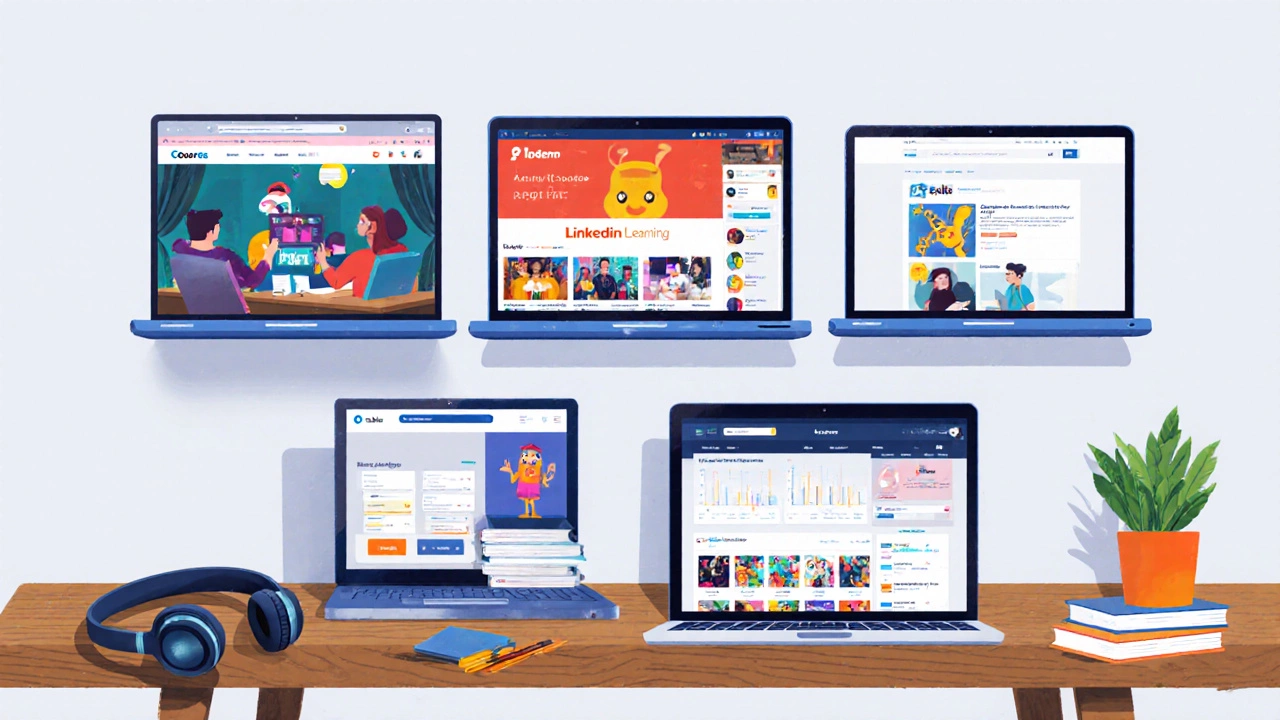
E-Learning Platform Finder
Find Your Perfect E-Learning Platform
Answer a few questions about your learning goals and budget to receive a personalized recommendation from the top platforms.
Your Recommended Platform
Finding the best e learning platform can feel like hunting for a needle in a haystack, especially when every service crowns itself as "the most affordable" or "the most engaging". This guide cuts through the hype, giving you a clear roadmap to pick the platform that actually fits your goals, budget, and learning style.
How to Choose the Right Platform
Before we dive into specific services, use these five decision criteria as a checklist. Each criterion maps to a real‑world need you’ll likely encounter.
- Course breadth and depth: Do you need a wide catalog (tech, business, arts) or deep specialization (data science, exam prep)?
- Pricing model: Subscription, pay‑per‑course, or free with optional certificates? Calculate the annual cost per hour of content to compare fair‑handedly.
- Credential value: Some platforms partner with universities; others give only completion badges. Consider whether a verified certificate matters for your résumé.
- Learning experience: Look for features like quizzes, hands‑on labs, community forums, and mobile offline access.
- Support & accessibility: 24/7 help, subtitles, and adaptive UI can be make‑or‑break for non‑native speakers or learners with disabilities.
Keep this list handy; we’ll refer back to it when rating each platform.
Platform Overviews
Below are concise profiles of six leading services that dominate the market in 2025.
Coursera is a global online learning platform that partners with top universities and companies to deliver full‑degree programs, professional certificates, and short courses. It excels in accredited content and offers financial aid for many courses.
- Pricing: $39‑$399 per month (subscription) or $49‑$499 per course.
- Best for: Learners chasing university‑tracked credentials or corporate‑grade certifications.
Udemy is a marketplace where individual instructors sell courses on virtually any topic. Prices swing wildly, but frequent sales bring courses down to $9‑$19.
- Pricing: Pay‑per‑course; lifetime access.
- Best for: Hobbyists and professionals seeking niche skills without a subscription commitment.
edX is a non‑profit platform founded by MIT and Harvard that offers university‑level courses, MicroMasters, and fully online degrees. Many courses are free to audit.
- Pricing: Free audit; $50‑$300 per verified certificate; $1,000‑$3,000 for MicroMasters.
- Best for: Academic‑focused learners who value rigorous curricula.
LinkedIn Learning is an on‑demand video library that integrates with LinkedIn profiles, offering courses in business, tech, and creative fields. A 1‑month free trial precedes the subscription.
- Pricing: $29.99 per month or $239.88 annually.
- Best for: Professionals who want to showcase newly acquired skills directly on their LinkedIn profile.
Skillshare is a community‑driven platform focused on creative, design, and entrepreneurship courses taught by practicing creators. The premium plan unlocks all classes.
- Pricing: $19 per month or $144 per year.
- Best for: Artists, designers, and freelancers who thrive on project‑based learning.
Khan Academy is a free, nonprofit educational site offering K‑12 curriculum, test prep, and foundational college topics. No paid tier.
- Pricing: Free.
- Best for: Students and lifelong learners needing structured, school‑aligned lessons without any cost.
Side‑by‑Side Comparison
| Platform | Pricing Model | Course Variety | Certification Credibility | Mobile/Offline | Ideal Audience |
|---|---|---|---|---|---|
| Coursera | Subscription & per‑course | 2000+ (university & corporate) | University‑backed, recognized | App with download | Career‑oriented, degree seekers |
| Udemy | Pay‑per‑course | 15,000+ (all topics) | Instructor‑issued, limited | App, limited offline | Hobbyists, budget learners |
| edX | Free audit / paid cert | 3000+ (academic focus) | University‑verified | App, offline videos | Academic enthusiasts |
| LinkedIn Learning | Subscription | 16,000+ (business & tech) | LinkedIn badge (industry‑wide) | App, offline view | Professionals & recruiters |
| Skillshare | Subscription | 30,000+ (creative focus) | Community badge | App, download limited | Creators, freelancers |
| Khan Academy | Free | 5,000+ (K‑12 & basics) | None (non‑certified) | App, offline available | Students, low‑cost learners |

Best Picks for Specific Needs
Use the matrix below to quickly decide which platform aligns with your main goal.
- Earn a university‑level certificate: Coursera or edX - they partner directly with accredited institutions.
- Learn a niche skill on a budget: Udemy - sales often drop courses below $10.
- Boost your LinkedIn profile: LinkedIn Learning - completed courses appear on your profile instantly.
- Develop creative projects: Skillshare - hands‑on classes with community feedback.
- Free, school‑aligned tutoring: Khan Academy - covers math, science, and test prep without a price tag.
Tips to Maximize Your Learning
Even the best platform won’t guarantee results if you don’t study smart.
- Set a weekly schedule and treat it like a class.
- Activate subtitles and playback speed controls for better comprehension.
- Join discussion forums or Discord servers linked to the course - peer accountability works wonders.
- Complete every quiz or hands‑on lab; active recall beats passive watching.
- Export certificates to LinkedIn, your résumé, or a personal portfolio for tangible proof.
Common Pitfalls & How to Avoid Them
Many learners quit early because they fall into these traps.
- Choosing based on price alone: A cheap course may lack depth; use the credential value criterion first.
- Signing up for a subscription you never use - set a reminder to cancel if you finish the intended courses. \n
- Skipping community interaction - isolation reduces motivation.
- Not tracking progress - use the platform’s “my learning” dashboard to stay accountable.
Final Thoughts
There’s no one‑size‑fits‑all answer, but by aligning your learning goals with the decision matrix above, you can confidently pick the platform that will actually move the needle for you. Remember: the platform is a tool; consistent effort is the real catalyst.
Which platform offers the most university‑level credentials?
Coursera and edX both partner with accredited universities. Coursera provides full degree programs, while edX offers MicroMasters and verified certificates that are widely recognized by academic institutions.
Is there a truly free e‑learning platform with high‑quality content?
Khan Academy delivers a vast catalog of K‑12 and early college material at no cost. While it doesn’t offer paid certifications, its lessons are rigorous and aligned with standard curricula.
How do I decide between a subscription and pay‑per‑course model?
If you plan to take multiple courses per month, a subscription (Coursera Plus, LinkedIn Learning, Skillshare) usually saves money. For occasional, one‑off learning, pay‑per‑course platforms like Udemy let you own the content forever.
Can I get employer reimbursement for courses on these platforms?
Many companies partner with Coursera for Business, Udemy for Business, and LinkedIn Learning to subsidize employee upskilling. Check your HR portal for eligible programs before purchasing.
What mobile features should I look for?
Offline download, variable playback speed, and note‑taking capabilities are essential for learning on the go. Coursera, Udemy, and Khan Academy all support offline video storage.





